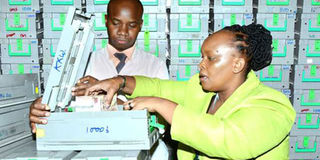Race against time for banks as CBK deadline beckons

Co-op Bank head of ATM and self-service Duke Sitemba and Service manager Coop House Branch Justina Musyimi recalibrating and testing ATM cassettes to dispense the new currency notes on June 16. Some banks are still dispensing old currency notes. PHOTO | FILE | NATION MEDIA GROUP
What you need to know:
- A spot check at various ATMs in Nairobi’s CBD showed that a number of banks were yet to configure their machines to only dispense the new currency notes.
- Some ATMs are even dispensing new Sh1,000 notes of the old currency to the confusion of ATM customers.
- But banks still argue that the Sh1,000 note is still legal tender and there is nothing to worry about.
- Kenya has about 1,700 ATMs, 780 commercial bank branches and 66,000 bank agents countrywide.
It’s a race against time for banks to reconfigure their cash dispensing machines ahead of the October 1 demonetisation of the Sh1,000 note.
Commercial banks are still dispensing the old note to customers more than a month after the Central Bank announced it was withdrawing the currency from circulation.
A spot check at various automated teller machines (ATMs) in Nairobi’s Central Business District showed that a number of banks were yet to configure their machines to dispense the new currency notes.
Some of the old generation Sh1,000 notes being dispensed are new, with consecutive serial numbers, suggesting that they are being dispensed for the first time.
NEW NOTES
Various establishments with parking machines are also not yet accepting the new notes five weeks into the demonetisation process, forcing motorists to find other ways of paying for parking services.
The Central Bank of Kenya (CBK), caught the country by surprise during the June 1 Madaraka Day celebrations, when it announced that it was withdrawing the Sh1,000 notes in a bid to counter counterfeits and money laundering.
Days after the announcement, commercial banks announced that they had started configuring their ATMs to start dispensing the new currency.
It was expected that once the banks configured their ATMs, they would only be dispensing the new notes to speed up the currency replacement process, returning the old ones to the CBK.
But banks still argue that the Sh1,000 note is still legal tender and there is nothing to worry about.
The Kenya Bankers Association (KBA) — the industry lobby that speaks for banks — said early this month that its members were reconfiguring teller machines and currency counters as part of the demonetisation exercise.
Kenya has about 1,700 ATMs, 780 commercial bank branches and 66,000 bank agents countrywide.
DISRUPTION
“We anticipate banks will have a structured replacement program that will ensure minimal disruption of regular services,” KBA spokesperson Nuru Mugambi said in an earlier statement.
KBA asked banks, bank agents and retailers, as well as citizens, to be especially vigilant during this period as there may be attempts to launder illicit money through the banking system.
Ms Mugambi did not pick our calls to clarify on when the configuration process will be completed and her e-mail reply showed she was not in office. The official she referred us to had not responded by the time of going to press.
Several bank executives said they did not want to comment on the matter either on record, but they offered that they were also puzzled and were waiting on line to see how the process will be speeded up in coming days.
The CBK told reporters at an earlier briefing that it had put in place mechanisms to ensure that all goes as plans and has maintained that it will not extend the October 1 deadline.
As the clock ticks, those with stolen or ill-gotten cash have less than three months to spend it or exchange it with the new notes.
Kenya is not the first country to walk down this path. India scrapped 500 and 1,000-rupee bank notes in 2016 to flush out tax evaders. However, this did not get the desired effects as 99 per cent of the money still got back into the system.
CAUSED CHAOS
A debt-ridden Nigeria introduced new currency and banned the old notes in 1984, under the Muhammadu Buhari government.
But this caused chaos and was blamed for the inflation that followed and crashed the economy.
Ghana attempted a similar move in 1982 when it ditched its 50 cedis note to deal with rampant tax evasion and empty excess liquidity. It had the downside of fuelling a currency black market.
North Korea tried this in 2010 but ended up leaving citizens with no food and shelter after Kim-Jong ll knocked off two zeros from the face value of the old currency in order to kick out the black market.
There have been at least five success stories where the exercise worked for the economy and resulted in the intended outcomes.
These include, Pakistan (2016), the UK (2002), Australia (1996), and the EU (2002). Zimbabwe attempted in 2015 and succeeded having gone for the US dollar.





